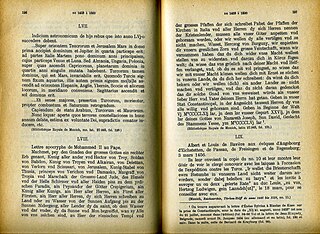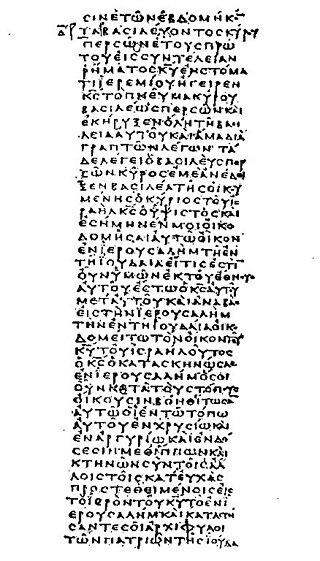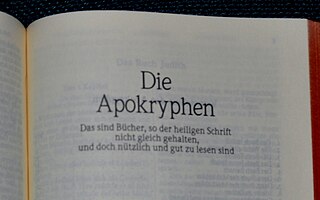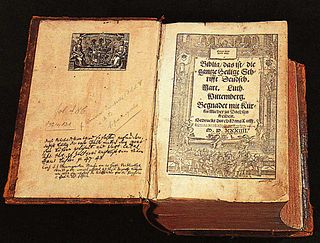
Apocrypha are biblical or related writings not forming part of the accepted canon of scripture. While some might be of doubtful authorship or authenticity, in Christianity, the word apocryphal (ἀπόκρυφος) was first applied to writings which were to be read privately rather than in the public context of church services. Apocrypha were edifying Christian works that were not considered canonical scripture. It was not until well after the Protestant Reformation that the word apocrypha was used by some ecclesiastics to mean "false," "spurious," "bad," or "heretical."

The Bible is a collection of religious texts or scriptures, some, all, or a variant of which are held to be sacred in Christianity, Judaism, Samaritanism, Islam, the Baha'i Faith, and other Abrahamic religions. The Bible is an anthology originally written in Hebrew, Aramaic, and Koine Greek. The texts include instructions, stories, poetry, prophecies, and other genres. The collection of materials that are accepted as part of the Bible by a particular religious tradition or community is called a biblical canon. Believers in the Bible generally consider it to be a product of divine inspiration, but the way they understand what that means and interpret the text varies.
The deuterocanonical books, meaning "Of, pertaining to, or constituting a second canon," collectively known as the Deuterocanon (DC), are certain books and passages considered to be canonical books of the Old Testament by the Catholic Church, the Eastern Orthodox Church, the Oriental Orthodox Churches and the Assyrian Church of the East, but which modern Jews and Protestants regard as apocrypha.
The Old Testament (OT) is the first division of the Christian biblical canon, which is based primarily upon the 24 books of the Hebrew Bible, or Tanakh, a collection of ancient religious Hebrew and occasionally Aramaic writings by the Israelites. The second division of Christian Bibles is the New Testament, written in Koine Greek.

The Septuagint, sometimes referred to as the Greek Old Testament or The Translation of the Seventy, and often abbreviated as LXX, is the earliest extant Greek translation of the Tanakh from the original Hebrew. The full Greek title derives from the story recorded in the Letter of Aristeas to Philocrates that "the laws of the Jews" were translated into the Greek language at the request of Ptolemy II Philadelphus by seventy-two Hebrew translators—six from each of the Twelve Tribes of Israel.

The Book of Tobit is an apocryphal Jewish work from the 3rd or early 2nd century BCE which describes how God tests the faithful, responds to prayers, and protects the covenant community. It tells the story of two Israelite families, that of the blind Tobit in Nineveh and of the abandoned Sarah in Ecbatana. Tobit's son Tobias is sent to retrieve ten silver talents that Tobit once left in Rhages, a town in Media. Guided and aided by the angel Raphael he arrives in Ecbatana, where he meets Sarah. A demon named Asmodeus has fallen in love with her and kills anyone she intends to marry, but with the aid of Raphael the demon is exorcised and Tobias and Sarah marry. Tobias and Sarah then return to Nineveh, where Tobit is cured of his blindness.

The New Revised Standard Version (NRSV) is a translation of the Bible in contemporary English. Published in 1989 by the National Council of Churches, the NRSV was created by an ecumenical committee of scholars "comprising about thirty members". The NRSV relies on recently published critical editions of the original Hebrew, Aramaic, and Greek texts. A major revision, the New Revised Standard Version Updated Edition (NRSVue), was released in 2021.

The Book of Baruch is a deuterocanonical book of the Bible, used in many Christian traditions, such as Catholic and Orthodox churches. In Judaism and Protestant Christianity, it is considered not to be part of the canon, with the Protestant Bibles categorizing it as part of the Biblical apocrypha. The book is named after Baruch ben Neriah, the prophet Jeremiah's scribe who is mentioned at Baruch 1:1, and has been presumed to be the author of the whole work. The book is a reflection of a late Jewish writer on the circumstances of Jewish exiles from Babylon, with meditations on the theology and history of Israel, discussions of wisdom, and a direct address to residents of Jerusalem and the Diaspora. Some scholars propose that it was written during or shortly after the period of the Maccabees.

The New Testament apocrypha are a number of writings by early Christians that give accounts of Jesus and his teachings, the nature of God, or the teachings of his apostles and of their lives. Some of these writings were cited as scripture by early Christians, but since the fifth century a widespread consensus has emerged limiting the New Testament to the 27 books of the modern canon. Roman Catholic, Eastern Orthodox, and Protestant churches generally do not view the New Testament apocrypha as part of the Bible.
1 Esdras, also Esdras A, Greek Esdras, Greek Ezra, or 3 Esdras, is the ancient Greek Septuagint version of the biblical Book of Ezra in use within the early church, and among many modern Christians with varying degrees of canonicity. 1 Esdras is substantially similar to the standard Hebrew version of Ezra–Nehemiah, with the passages specific to the career of Nehemiah removed or re-attributed to Ezra, and some additional material.
The Gospel of the Nazarenes is the traditional but hypothetical name given by some scholars to distinguish some of the references to, or citations of, non-canonical Jewish-Christian Gospels extant in patristic writings from other citations believed to derive from different Gospels.
The Letter of Jeremiah, also known as the Epistle of Jeremiah, is a deuterocanonical book of the Old Testament; this letter is attributed to Jeremiah and addressed to the Jews who were about to be carried away as captives to Babylon by Nebuchadnezzar. It is included in Roman Catholic Bibles as the final chapter of the Book of Baruch. It is also included in Orthodox Bibles as a separate book, as well as in the Apocrypha of the Authorized Version.
The additions of Daniel are three chapters not found in the Hebrew/Aramaic text of Daniel. The text of these chapters is found in the Koine Greek Septuagint, the earliest Old Greek translation.

The biblical apocrypha denotes the collection of apocryphal ancient books thought to have been written some time between 200 BCE and 100 CE.
The Old Testament is the first section of the two-part Christian biblical canon; the second section is the New Testament. The Old Testament includes the books of the Hebrew Bible (Tanakh) or protocanon, and in various Christian denominations also includes deuterocanonical books. Orthodox Christians, Catholics and Protestants use different canons, which differ with respect to the texts that are included in the Old Testament.
Biblical languages are any of the languages employed in the original writings of the Bible. Partially owing to the significance of the Bible in society, Biblical languages are studied more widely than many other dead languages. Furthermore, some debates exist as to which language is the original language of a particular passage, and about whether a term has been properly translated from an ancient language into modern editions of the Bible. Scholars generally recognize three languages as original biblical languages: Hebrew, Aramaic, and Koine Greek.

The term Catholic Bible can be understood in two ways. More generally, it can refer to a Christian Bible that includes the whole 73-book canon recognized by the Catholic Church, including some of the deuterocanonical books of the Old Testament which are in the Greek Septuagint collection, but which are not present in the Hebrew Masoretic Text collection. More specifically, the term can refer to a version or translation of the Bible which is published with the Catholic Church's approval, in accordance with Catholic canon law.
The Book of Sirach is an apocryphal Jewish work, originally written in Biblical Hebrew. The longest extant wisdom book from antiquity, it consists of ethical teachings, written approximately between 196 and 175 BCE by Yeshua ben Eleazar ben Sira, a Hellenistic Jewish scribe of the Second Temple period.
A biblical canon is a set of texts which a particular Jewish or Christian religious community regards as part of the Bible.

A Protestant Bible is a Christian Bible whose translation or revision was produced by Protestant Christians. Typically translated into a vernacular language, such Bibles comprise 39 books of the Old Testament and 27 books of the New Testament, for a total of 66 books. Some Protestants use Bibles which also include 14 additional books in a section known as the Apocrypha bringing the total to 80 books. This is in contrast with the 73 books of the Catholic Bible, which includes seven deuterocanonical books as a part of the Old Testament. The division between protocanonical and deuterocanonical books is not accepted by all Protestants who simply view books as being canonical or not and therefore classify books found in the Deuterocanon, along with other books, as part of the Apocrypha. Sometimes the term "Protestant Bible" is simply used as a shorthand for a bible which contains only the 66 books of the Old and New Testaments.











